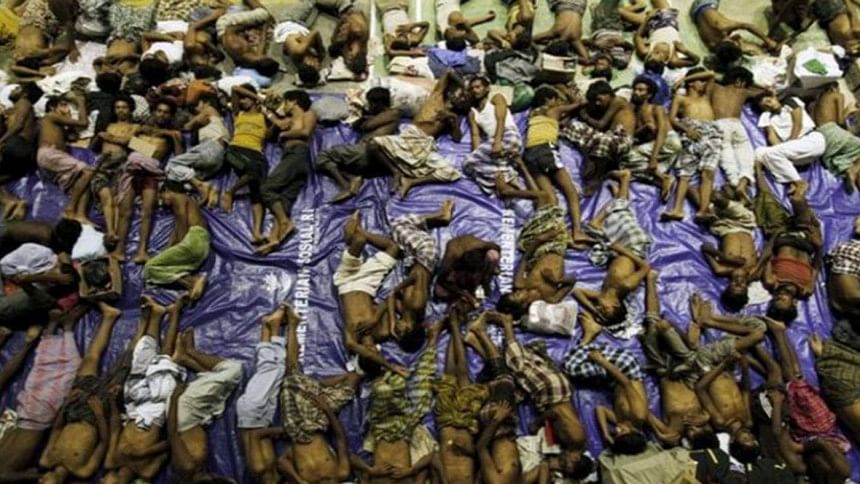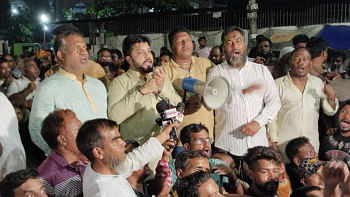'Thousands' of Rohingya and Bangladeshi migrants stranded at sea

Thousands of refugees from Bangladesh and Myanmar are stranded at sea close to Thailand, according to an international migration agency.
The International Organisation for Migration (IOM) told the BBC that a Thai crackdown on recent arrivals meant many smugglers were now reluctant to land.
As many as 8,000 people are believed to be stuck on boats, the IOM said.
In the past two days, more than 2,000 have arrived in Malaysia or Indonesia after being rescued or swimming ashore.
Jeff Labovitz, head of mission for IOM Asia Pacific, told the BBC that the last week’s discovery of dozens of human remains in abandoned camps in the south of Thailand had prompted a police crackdown and therefore people smugglers were holding their boats at sea.
Bangladeshi migrants, and ethnic Rohingyas who face persecution in Myanmar, are normally brought by people smugglers to Thailand where they are effectively held ransom until they can raise money for their onward journey to Malaysia and beyond.
ANALYSIS: JONATHAN HEAD, SOUTH EAST ASIA CORRESPONDENT
Specialists in trafficking inside the DSI - Thailand's equivalent of the American FBI - and the military's ISOC national security units, have been telling me for months that they were building up cases against known agents in the human trade. They just could not be sure they would get backing from the top levels of the military government. Some local officials, horrified by the abuses in their districts, took it on themselves to run roadblocks, or hunt down trafficking camps.
But it was the discovery of mass graves last week that spurred the government into concerted action, with Prime Minister Prayuth Chan-ocha issuing a 10-day deadline to expose the camps that have been hidden for years in the rubber plantations covering much of Thailand's south.
Today I watched men from communities that are known to have profited from trafficking by hosting camps in their plantations, being forced to go out and 'discover' those camps. The brokers have mostly fled, leaving hundreds of half-starved migrants wandering about in the jungle.
"Boats seem to have stopped coming - but some are en route and some are waiting to off-load. Where they used to process people on land, for final payments, they are now doing this off-shore - so more people are being held off-shore. Now things have become so hot, there's nowhere for them to go," Labovitz said.
He said that an estimate by the Arakan Project - which monitors the movements of Rohingyas - that 8,000 people are stranded at sea could not be verified, but seemed credible.
Malaysian officials said on Monday that 1,018 Bangladeshi and Rohingya refugees had landed illegally on Langkawi Island, apparently abandoned by people smugglers who were transporting them to Thailand.
Indonesian authorities rescued nearly 600 migrants stranded off the coast of Aceh on Sunday and more than 400 others early on Monday.
WHO ARE THE ROHINGYAS?
Rohingyas are a distinct, Muslim ethnic group mainly living in Myanmar, which is also known as Burma
Thought to be descended from Muslim traders who settled there more than 1,000 years ago
Also live in Bangladesh, Saudi Arabia and Pakistan
In Myanmar, they are regularly persecuted - subjected to forced labour, have no land rights, and are heavily restricted
In Bangladesh many are also desperately poor, with no documents or job prospects
MYANMAR'S UNWANTED PEOPLE
A report by the UN refugee agency UNHCR said on Friday that 25,000 migrants boarded people smugglers' boats from Myanmar and Bangladesh in 2015's first quarter - about double the number who left over the same period in 2014. It said about 300 people died at sea from January to March this year.
It added that the increase in migration from the area has been attributed to a variety of factors, including political developments in Myanmar, and wives and children wishing to join the men who have already migrated.
Three Thais and a Burmese national have been arrested on suspicion of human trafficking after last week's discovery of shallow graves in abandoned camps in southern Thailand.

 For all latest news, follow The Daily Star's Google News channel.
For all latest news, follow The Daily Star's Google News channel. 



Comments